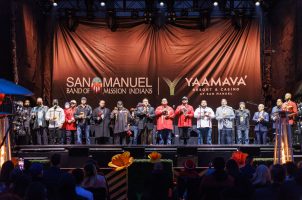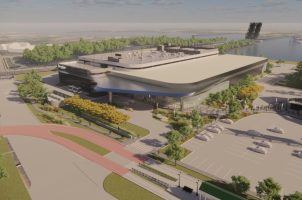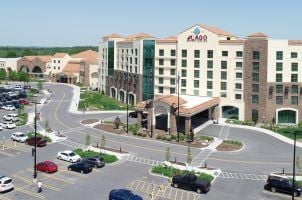Norfolk Pushes Pamunkey to go Commercial While Scaling Back Original Estimates for Casino Project
Posted on: December 18, 2019, 08:45h.
Last updated on: December 18, 2019, 10:07h.
At a public hearing earlier this week, Norfolk, Va. Mayor Kenny Alexander (D) announced significant alterations to the city’s effort to become home to a casino. That included plans to require the Pamunkey Indian Tribe to open a commercial, not a tribal, gaming property.

In September, the tribe agreed to pay almost $10 million to purchase waterfront property from the city, paving the way to bring an integrated resort to the Harbor Park area along the Elizabeth River. At that time, Pamunkey hadn’t decided if it would opt for a commercial or tribal gaming venue. Tribal casinos have more favorable federal tax treatment than their commercial counterparts.
Alexander has made that decision for the tribe while significantly scaling back the scope of the Norfolk casino project.
After theJLARC study, and realizing that the scope of the project will change the commercial route, [it] makes more sense for both the Pamunkey Tribe and the City of Norfolk,” said Councilman Tommy Smigiel in a Facebook post.
The JLARC study Smigiel is referring to is the Virginia Joint Legislative Audit and Review Committee (JLARC) inquiry, a 200-page report released last month examining gaming expansion in the commonwealth.
Lesser Expectations
The JLARC review concludes that more casino gaming options can work in Virginia, but also warned cities and stakeholders against creating unreasonable expectations.
Initially, Norfolk and the Pamunkey Tribe hoped for a $700 million gaming property that would create 3,500 permanent jobs with an annual payroll of $141 million, while generating $825 million in annual revenue, of which $33 million would go to the city.
Alexander said at the public hearing that the project would likely be valued at just $200 million, while fostering 1,000 jobs. Changes were also made to the revenue funding formula.
Another plus tonight is that this potential revenue falls under the new revenue funding formula we created for Norfolk Public Schools, so it would not be necessary to have a separate agreement on where the tax revenue should go,” said Smigiel in his Facebook post.
The agreement reached between the tribe and the city in September must be altered to reflect a lower tax rate than the four percent promised with the $700 million price tag.
Still Work To Be Done
Casino gaming remains prohibited in Virginia, but there is some momentum for legislation proposed sponsored by Sen. Louise Lucas, D-Portsmouth, to change that. If her bill is approved, it would give voters in the cities of Bristol, Danville, Portsmouth, Norfolk, and Richmond – the areas where Virginia gaming properties would be located – an opportunity to approve or reject those plans on the 2020 ballot.
Hard Rock International is set to be the operator of a planned $250 million gaming venue in Portsmouth.
As for Norfolk, the city council will be holding another public hearing on the casino issue on Thursday, Dec. 19.
Related News Articles
Most Popular
Las Vegas Overstated F1 Race’s Vegas Impact — Report
Vegas Strip Clubs Wrestle in Court Over Animal Names
Most Commented
-
End of the Line for Las Vegas Monorail
— April 5, 2024 — 90 Comments -
Mega Millions Reportedly Mulling Substantial Ticket Price Increase
— April 16, 2024 — 6 Comments -
Long Island Casino Opponents Love New York Licensing Delays
— March 27, 2024 — 5 Comments
















Last Comment ( 1 )
This is one of the worst ways of bringing in revenue. We’re opening the door for the beginning of city Blythe as homes will fall pry to the addiction of gambling. Statistics proves that crime rises as a result of gambling. The mob moves in, money borrowed and lives are lost. Property break in’s etc. Are we willing to gamble our quality of life for 1,000.00 jobs??? Let's take a lesson from Detroit and Vegas, the living is dangerous and to live in either state is not affordable to the middle class, schools suffer, children are neglected as parent’s play a game of hope. Remember the ”house Never loses”.